Robotics in Healthcare: Analyzing Impact, Ethics, and Disruption
VerifiedAdded on 2023/06/11
|7
|1071
|291
Report
AI Summary
This report explores the impact of robotics in the healthcare industry, emphasizing its role in enhancing efficiency and accuracy. It discusses how robotics assists human healthcare professionals and supports non-health-related operations like management and record maintenance. The integration of IoT with robotics is highlighted for its significant impact, along with considerations of regulations and ethics based on Lawrence Lessig’s framework, including legal enablement, architectural costs, economic benefits, and data security threats. The report analyzes the disruption caused by robotics in health monitoring, contrasting current processes with future automated systems. A video script is included, presenting a discussion on the reliability and benefits of robots in healthcare, recommending their use as assistance to doctors until they achieve full artificial intelligence. The report concludes by advocating for the adoption of robotics to improve healthcare operations and resource utilization.
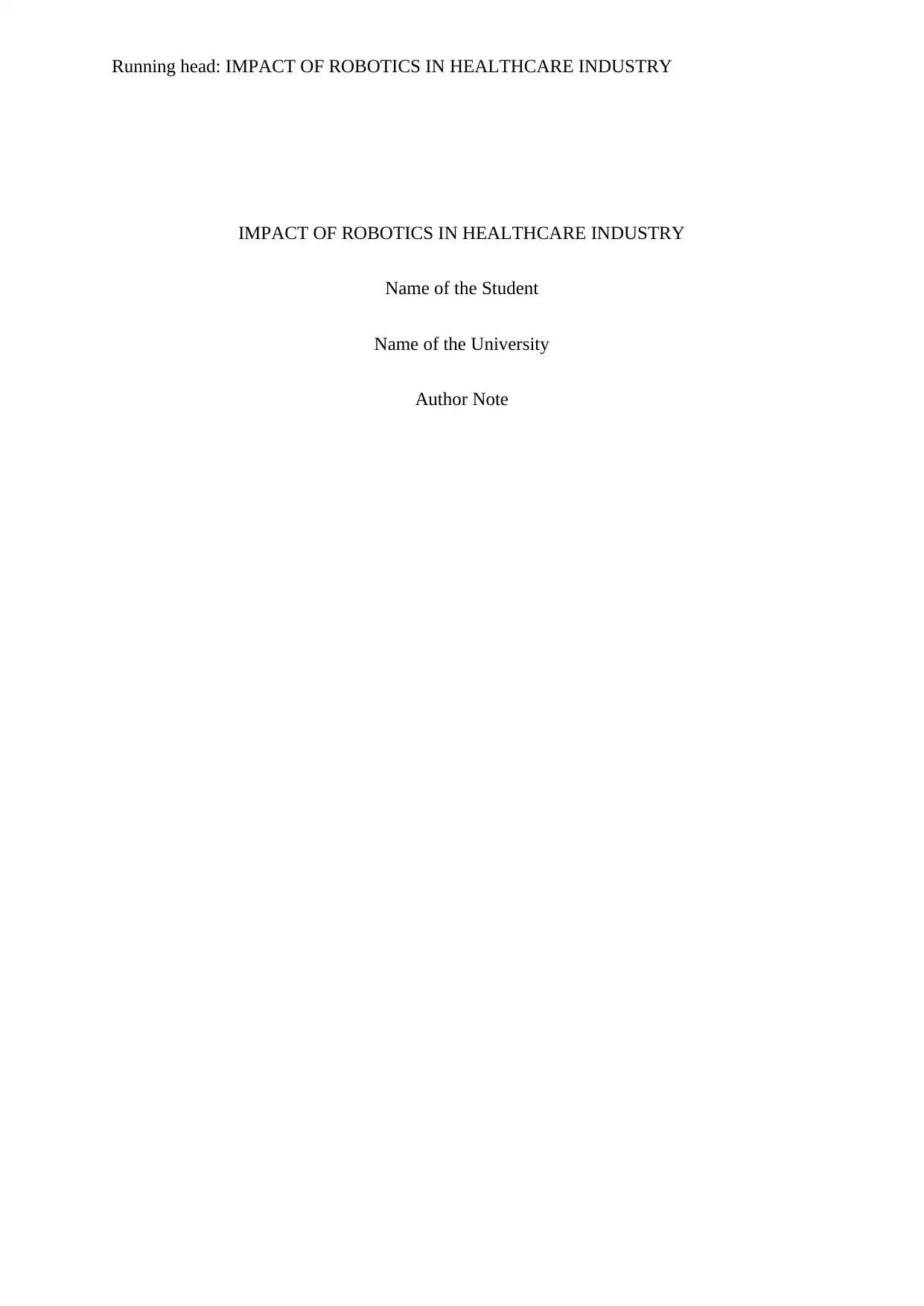
Running head: IMPACT OF ROBOTICS IN HEALTHCARE INDUSTRY
IMPACT OF ROBOTICS IN HEALTHCARE INDUSTRY
Name of the Student
Name of the University
Author Note
IMPACT OF ROBOTICS IN HEALTHCARE INDUSTRY
Name of the Student
Name of the University
Author Note
Paraphrase This Document
Need a fresh take? Get an instant paraphrase of this document with our AI Paraphraser
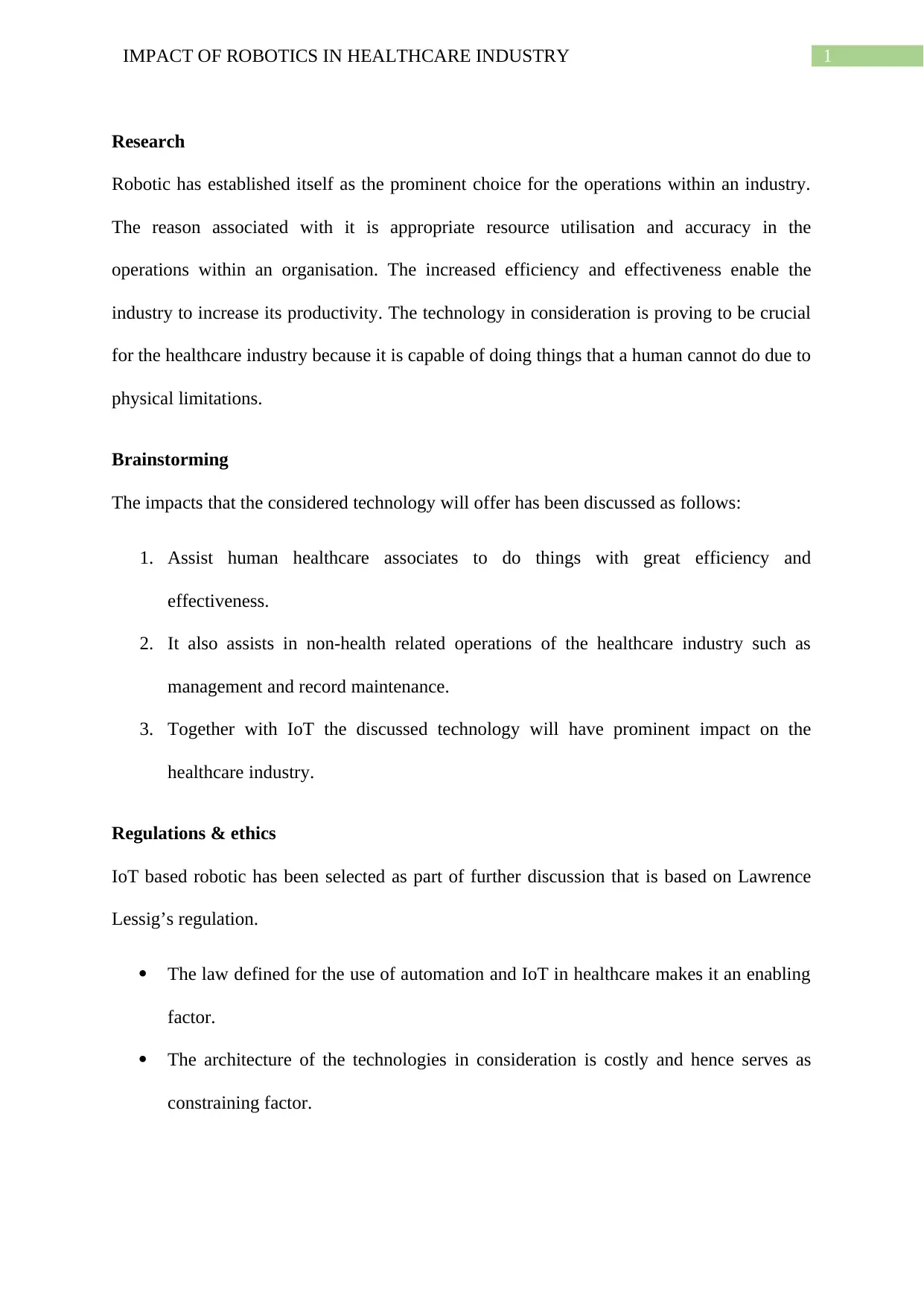
1IMPACT OF ROBOTICS IN HEALTHCARE INDUSTRY
Research
Robotic has established itself as the prominent choice for the operations within an industry.
The reason associated with it is appropriate resource utilisation and accuracy in the
operations within an organisation. The increased efficiency and effectiveness enable the
industry to increase its productivity. The technology in consideration is proving to be crucial
for the healthcare industry because it is capable of doing things that a human cannot do due to
physical limitations.
Brainstorming
The impacts that the considered technology will offer has been discussed as follows:
1. Assist human healthcare associates to do things with great efficiency and
effectiveness.
2. It also assists in non-health related operations of the healthcare industry such as
management and record maintenance.
3. Together with IoT the discussed technology will have prominent impact on the
healthcare industry.
Regulations & ethics
IoT based robotic has been selected as part of further discussion that is based on Lawrence
Lessig’s regulation.
The law defined for the use of automation and IoT in healthcare makes it an enabling
factor.
The architecture of the technologies in consideration is costly and hence serves as
constraining factor.
Research
Robotic has established itself as the prominent choice for the operations within an industry.
The reason associated with it is appropriate resource utilisation and accuracy in the
operations within an organisation. The increased efficiency and effectiveness enable the
industry to increase its productivity. The technology in consideration is proving to be crucial
for the healthcare industry because it is capable of doing things that a human cannot do due to
physical limitations.
Brainstorming
The impacts that the considered technology will offer has been discussed as follows:
1. Assist human healthcare associates to do things with great efficiency and
effectiveness.
2. It also assists in non-health related operations of the healthcare industry such as
management and record maintenance.
3. Together with IoT the discussed technology will have prominent impact on the
healthcare industry.
Regulations & ethics
IoT based robotic has been selected as part of further discussion that is based on Lawrence
Lessig’s regulation.
The law defined for the use of automation and IoT in healthcare makes it an enabling
factor.
The architecture of the technologies in consideration is costly and hence serves as
constraining factor.
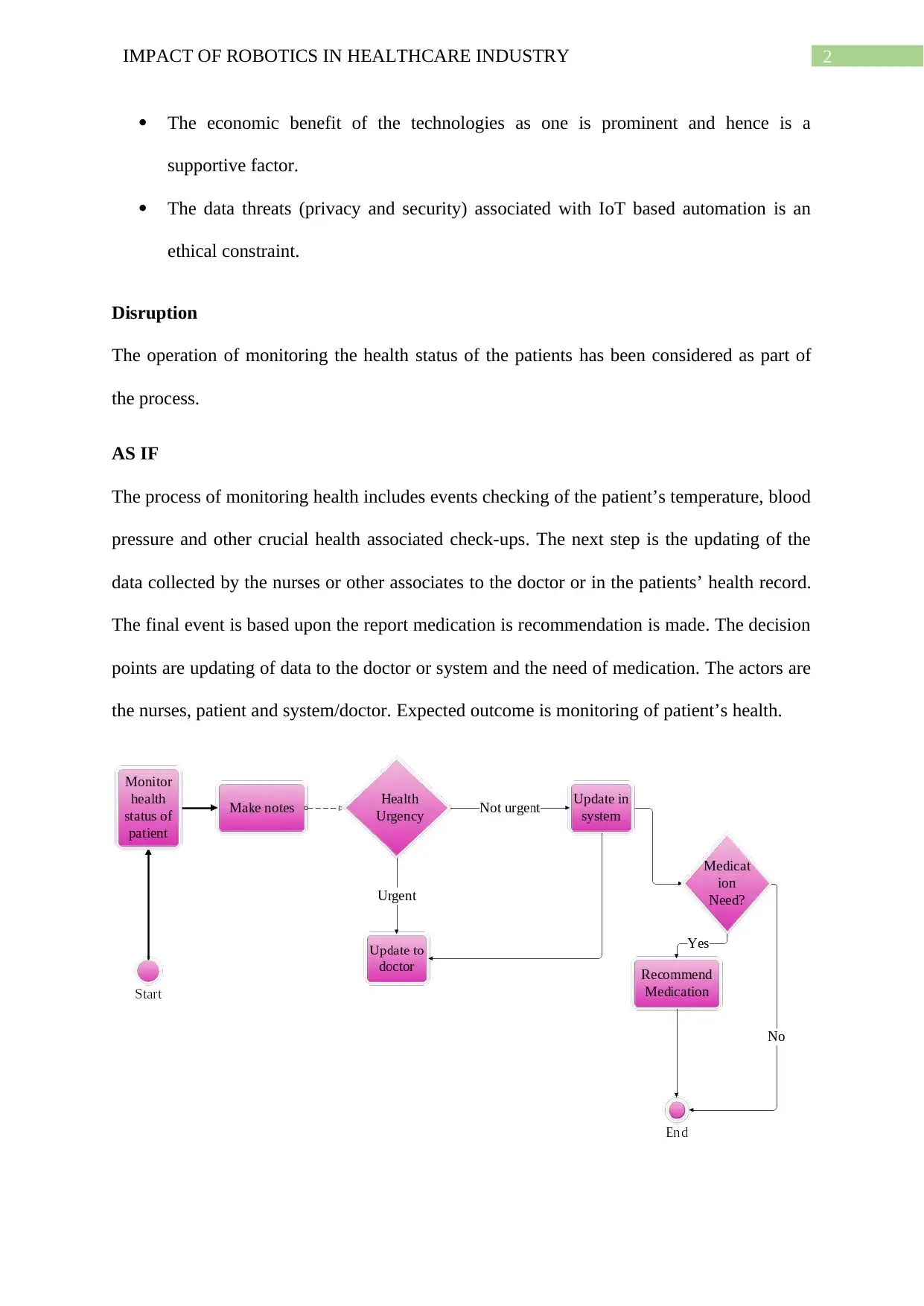
2IMPACT OF ROBOTICS IN HEALTHCARE INDUSTRY
The economic benefit of the technologies as one is prominent and hence is a
supportive factor.
The data threats (privacy and security) associated with IoT based automation is an
ethical constraint.
Disruption
The operation of monitoring the health status of the patients has been considered as part of
the process.
AS IF
The process of monitoring health includes events checking of the patient’s temperature, blood
pressure and other crucial health associated check-ups. The next step is the updating of the
data collected by the nurses or other associates to the doctor or in the patients’ health record.
The final event is based upon the report medication is recommendation is made. The decision
points are updating of data to the doctor or system and the need of medication. The actors are
the nurses, patient and system/doctor. Expected outcome is monitoring of patient’s health.
The economic benefit of the technologies as one is prominent and hence is a
supportive factor.
The data threats (privacy and security) associated with IoT based automation is an
ethical constraint.
Disruption
The operation of monitoring the health status of the patients has been considered as part of
the process.
AS IF
The process of monitoring health includes events checking of the patient’s temperature, blood
pressure and other crucial health associated check-ups. The next step is the updating of the
data collected by the nurses or other associates to the doctor or in the patients’ health record.
The final event is based upon the report medication is recommendation is made. The decision
points are updating of data to the doctor or system and the need of medication. The actors are
the nurses, patient and system/doctor. Expected outcome is monitoring of patient’s health.
⊘ This is a preview!⊘
Do you want full access?
Subscribe today to unlock all pages.

Trusted by 1+ million students worldwide
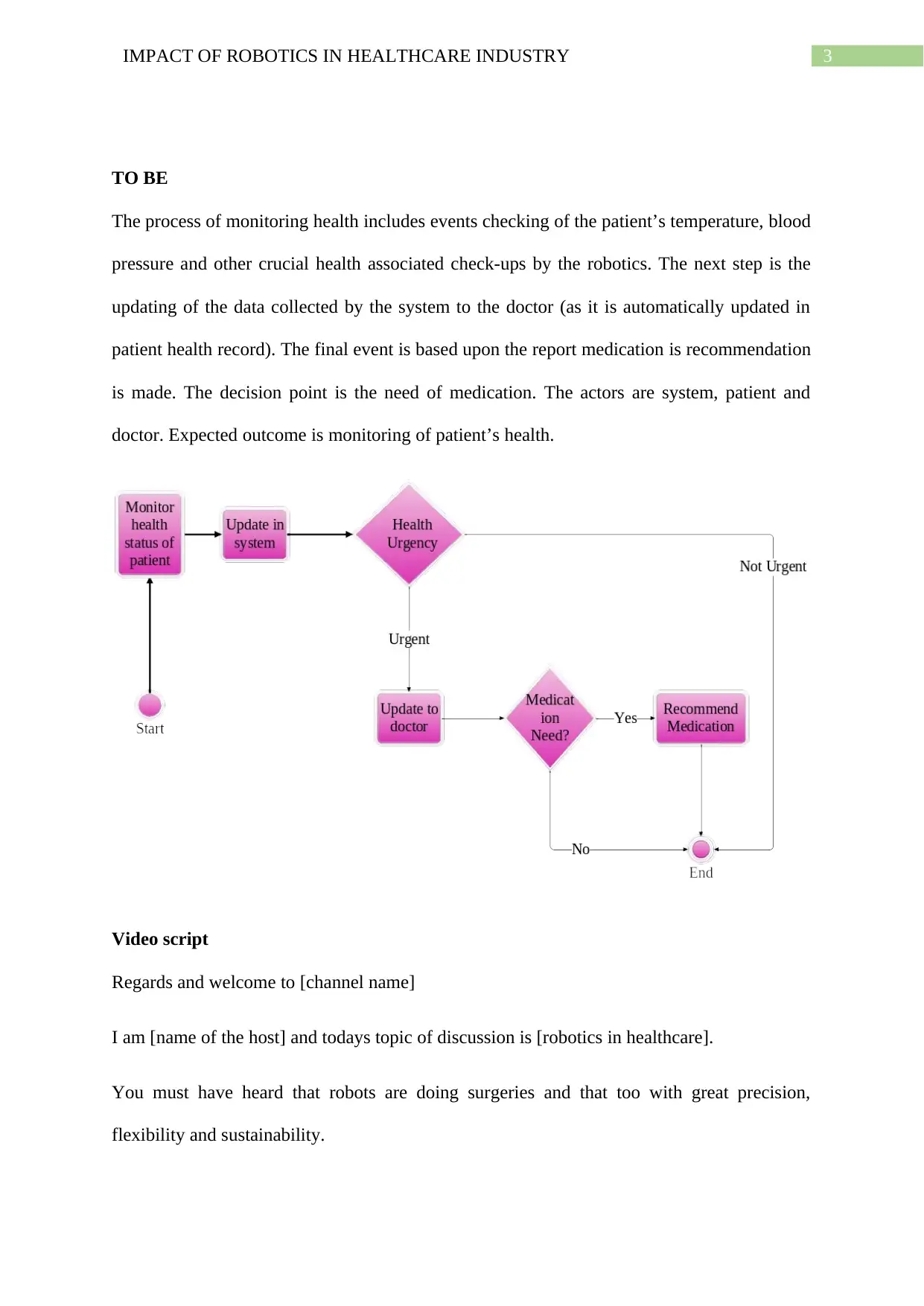
3IMPACT OF ROBOTICS IN HEALTHCARE INDUSTRY
TO BE
The process of monitoring health includes events checking of the patient’s temperature, blood
pressure and other crucial health associated check-ups by the robotics. The next step is the
updating of the data collected by the system to the doctor (as it is automatically updated in
patient health record). The final event is based upon the report medication is recommendation
is made. The decision point is the need of medication. The actors are system, patient and
doctor. Expected outcome is monitoring of patient’s health.
Video script
Regards and welcome to [channel name]
I am [name of the host] and todays topic of discussion is [robotics in healthcare].
You must have heard that robots are doing surgeries and that too with great precision,
flexibility and sustainability.
TO BE
The process of monitoring health includes events checking of the patient’s temperature, blood
pressure and other crucial health associated check-ups by the robotics. The next step is the
updating of the data collected by the system to the doctor (as it is automatically updated in
patient health record). The final event is based upon the report medication is recommendation
is made. The decision point is the need of medication. The actors are system, patient and
doctor. Expected outcome is monitoring of patient’s health.
Video script
Regards and welcome to [channel name]
I am [name of the host] and todays topic of discussion is [robotics in healthcare].
You must have heard that robots are doing surgeries and that too with great precision,
flexibility and sustainability.
Paraphrase This Document
Need a fresh take? Get an instant paraphrase of this document with our AI Paraphraser
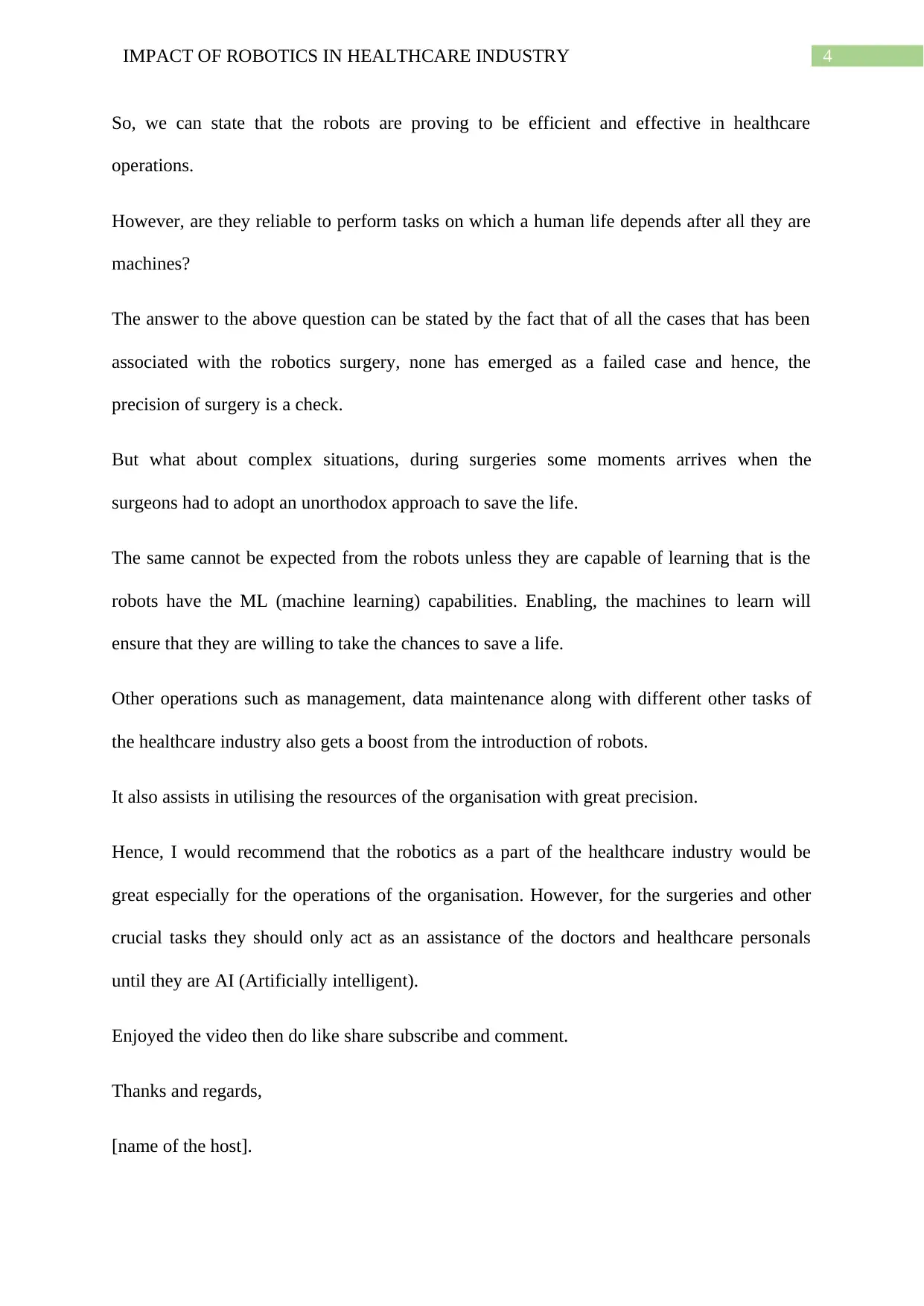
4IMPACT OF ROBOTICS IN HEALTHCARE INDUSTRY
So, we can state that the robots are proving to be efficient and effective in healthcare
operations.
However, are they reliable to perform tasks on which a human life depends after all they are
machines?
The answer to the above question can be stated by the fact that of all the cases that has been
associated with the robotics surgery, none has emerged as a failed case and hence, the
precision of surgery is a check.
But what about complex situations, during surgeries some moments arrives when the
surgeons had to adopt an unorthodox approach to save the life.
The same cannot be expected from the robots unless they are capable of learning that is the
robots have the ML (machine learning) capabilities. Enabling, the machines to learn will
ensure that they are willing to take the chances to save a life.
Other operations such as management, data maintenance along with different other tasks of
the healthcare industry also gets a boost from the introduction of robots.
It also assists in utilising the resources of the organisation with great precision.
Hence, I would recommend that the robotics as a part of the healthcare industry would be
great especially for the operations of the organisation. However, for the surgeries and other
crucial tasks they should only act as an assistance of the doctors and healthcare personals
until they are AI (Artificially intelligent).
Enjoyed the video then do like share subscribe and comment.
Thanks and regards,
[name of the host].
So, we can state that the robots are proving to be efficient and effective in healthcare
operations.
However, are they reliable to perform tasks on which a human life depends after all they are
machines?
The answer to the above question can be stated by the fact that of all the cases that has been
associated with the robotics surgery, none has emerged as a failed case and hence, the
precision of surgery is a check.
But what about complex situations, during surgeries some moments arrives when the
surgeons had to adopt an unorthodox approach to save the life.
The same cannot be expected from the robots unless they are capable of learning that is the
robots have the ML (machine learning) capabilities. Enabling, the machines to learn will
ensure that they are willing to take the chances to save a life.
Other operations such as management, data maintenance along with different other tasks of
the healthcare industry also gets a boost from the introduction of robots.
It also assists in utilising the resources of the organisation with great precision.
Hence, I would recommend that the robotics as a part of the healthcare industry would be
great especially for the operations of the organisation. However, for the surgeries and other
crucial tasks they should only act as an assistance of the doctors and healthcare personals
until they are AI (Artificially intelligent).
Enjoyed the video then do like share subscribe and comment.
Thanks and regards,
[name of the host].
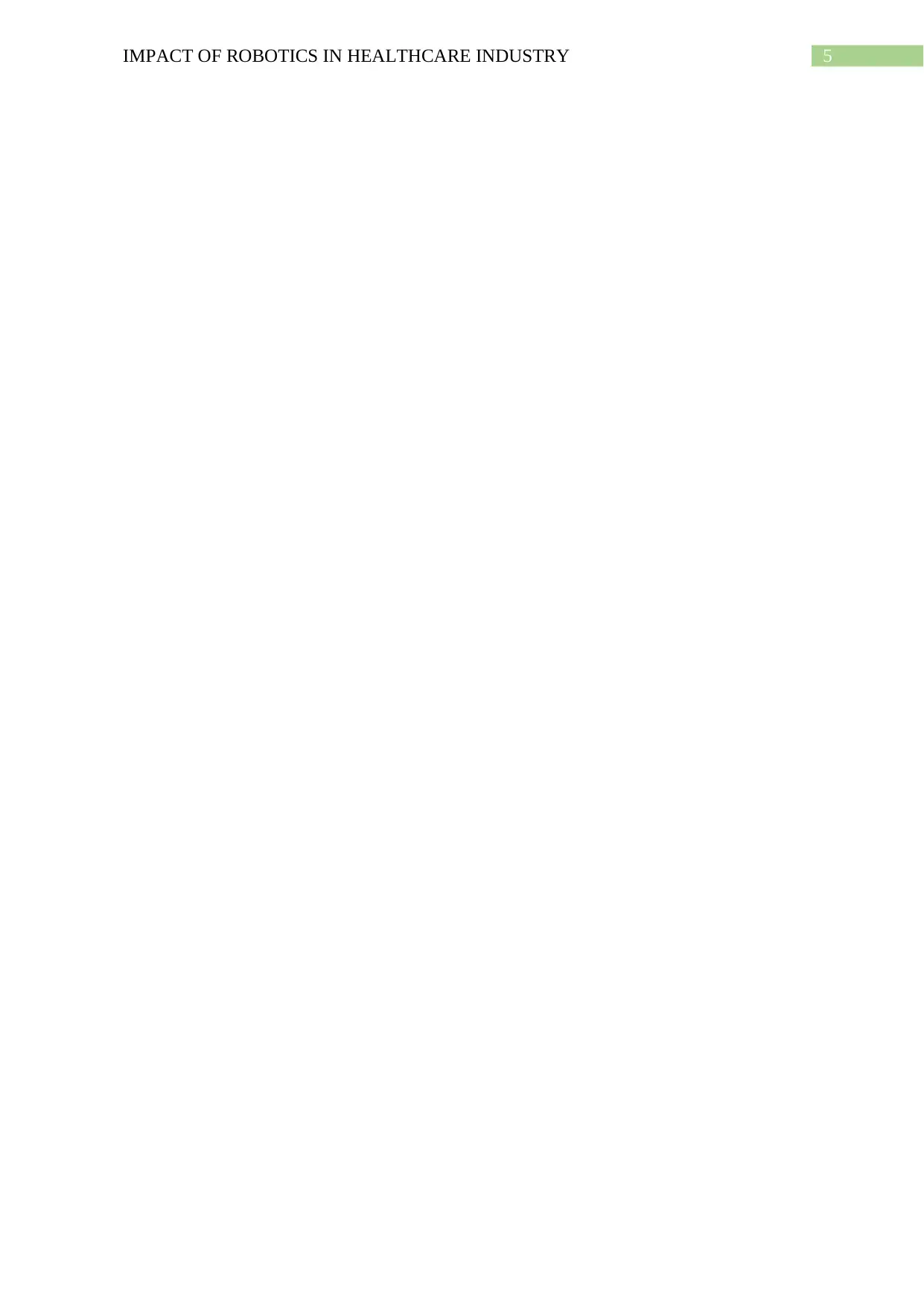
5IMPACT OF ROBOTICS IN HEALTHCARE INDUSTRY
⊘ This is a preview!⊘
Do you want full access?
Subscribe today to unlock all pages.

Trusted by 1+ million students worldwide
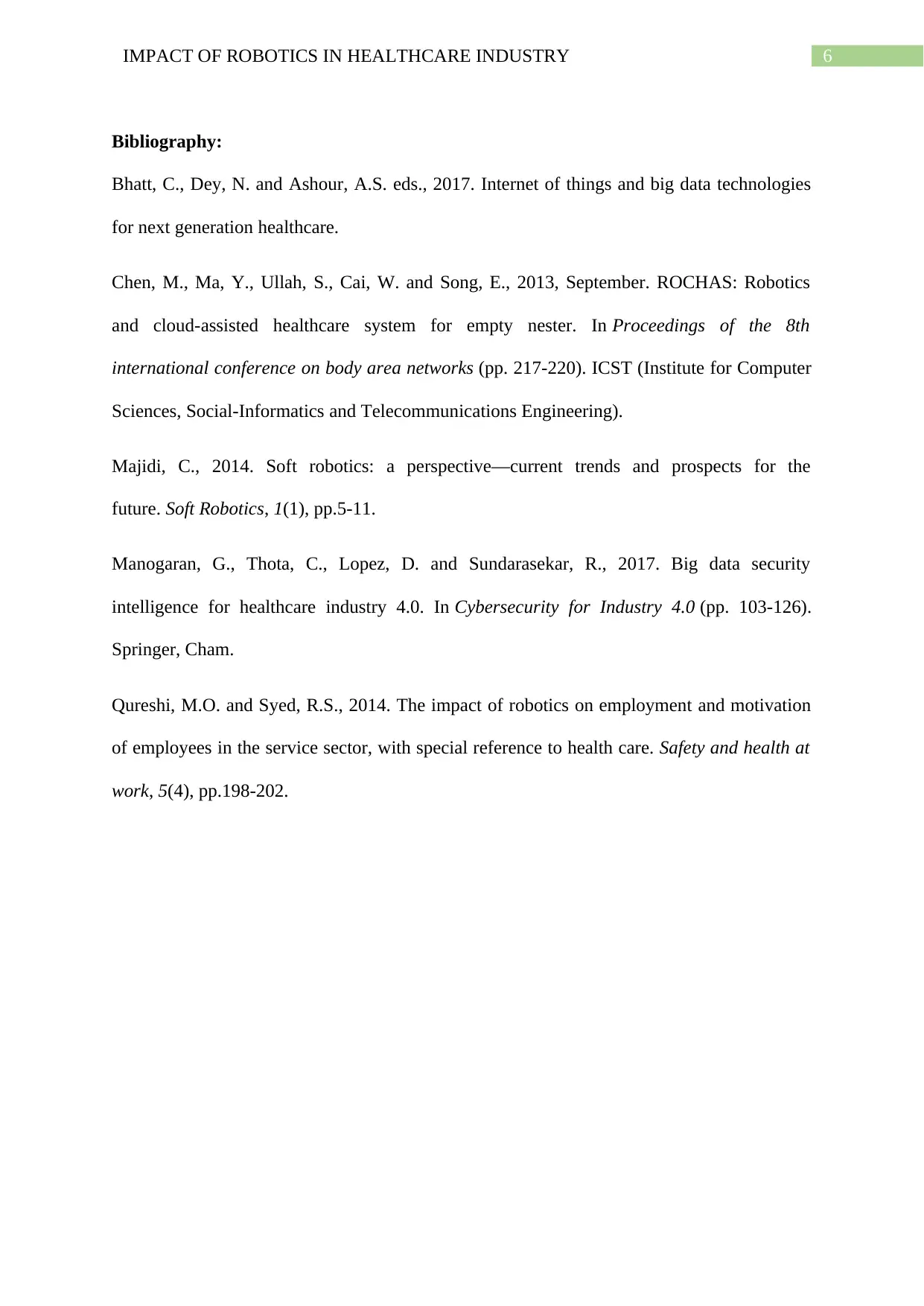
6IMPACT OF ROBOTICS IN HEALTHCARE INDUSTRY
Bibliography:
Bhatt, C., Dey, N. and Ashour, A.S. eds., 2017. Internet of things and big data technologies
for next generation healthcare.
Chen, M., Ma, Y., Ullah, S., Cai, W. and Song, E., 2013, September. ROCHAS: Robotics
and cloud-assisted healthcare system for empty nester. In Proceedings of the 8th
international conference on body area networks (pp. 217-220). ICST (Institute for Computer
Sciences, Social-Informatics and Telecommunications Engineering).
Majidi, C., 2014. Soft robotics: a perspective—current trends and prospects for the
future. Soft Robotics, 1(1), pp.5-11.
Manogaran, G., Thota, C., Lopez, D. and Sundarasekar, R., 2017. Big data security
intelligence for healthcare industry 4.0. In Cybersecurity for Industry 4.0 (pp. 103-126).
Springer, Cham.
Qureshi, M.O. and Syed, R.S., 2014. The impact of robotics on employment and motivation
of employees in the service sector, with special reference to health care. Safety and health at
work, 5(4), pp.198-202.
Bibliography:
Bhatt, C., Dey, N. and Ashour, A.S. eds., 2017. Internet of things and big data technologies
for next generation healthcare.
Chen, M., Ma, Y., Ullah, S., Cai, W. and Song, E., 2013, September. ROCHAS: Robotics
and cloud-assisted healthcare system for empty nester. In Proceedings of the 8th
international conference on body area networks (pp. 217-220). ICST (Institute for Computer
Sciences, Social-Informatics and Telecommunications Engineering).
Majidi, C., 2014. Soft robotics: a perspective—current trends and prospects for the
future. Soft Robotics, 1(1), pp.5-11.
Manogaran, G., Thota, C., Lopez, D. and Sundarasekar, R., 2017. Big data security
intelligence for healthcare industry 4.0. In Cybersecurity for Industry 4.0 (pp. 103-126).
Springer, Cham.
Qureshi, M.O. and Syed, R.S., 2014. The impact of robotics on employment and motivation
of employees in the service sector, with special reference to health care. Safety and health at
work, 5(4), pp.198-202.
1 out of 7
Related Documents
Your All-in-One AI-Powered Toolkit for Academic Success.
+13062052269
info@desklib.com
Available 24*7 on WhatsApp / Email
![[object Object]](/_next/static/media/star-bottom.7253800d.svg)
Unlock your academic potential
Copyright © 2020–2026 A2Z Services. All Rights Reserved. Developed and managed by ZUCOL.




